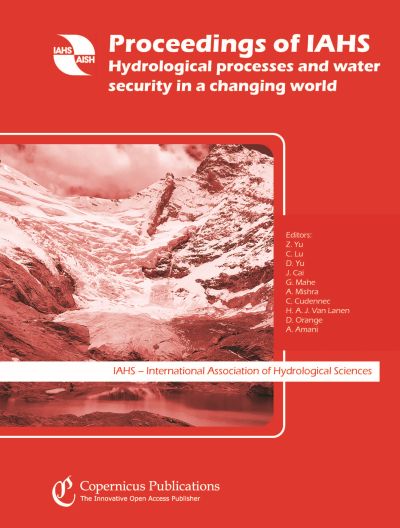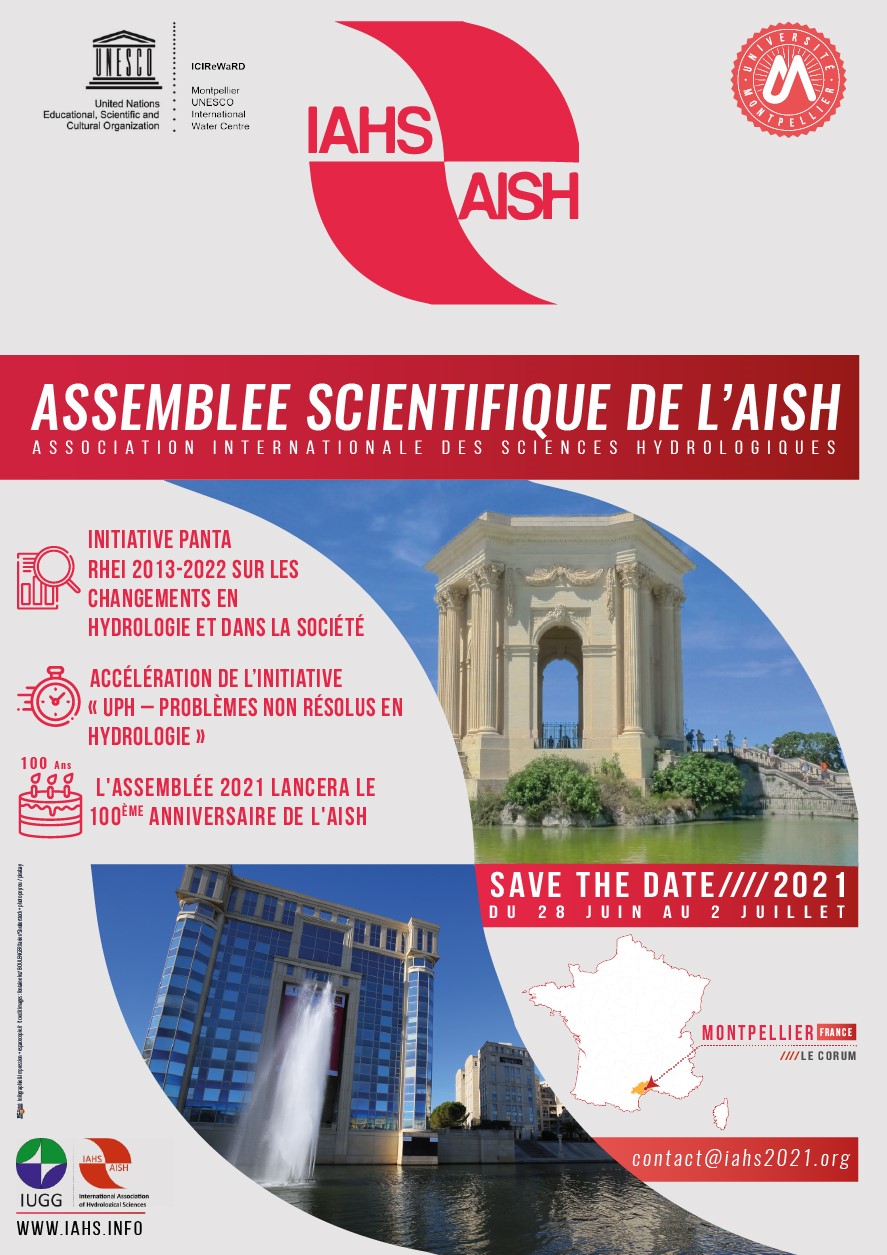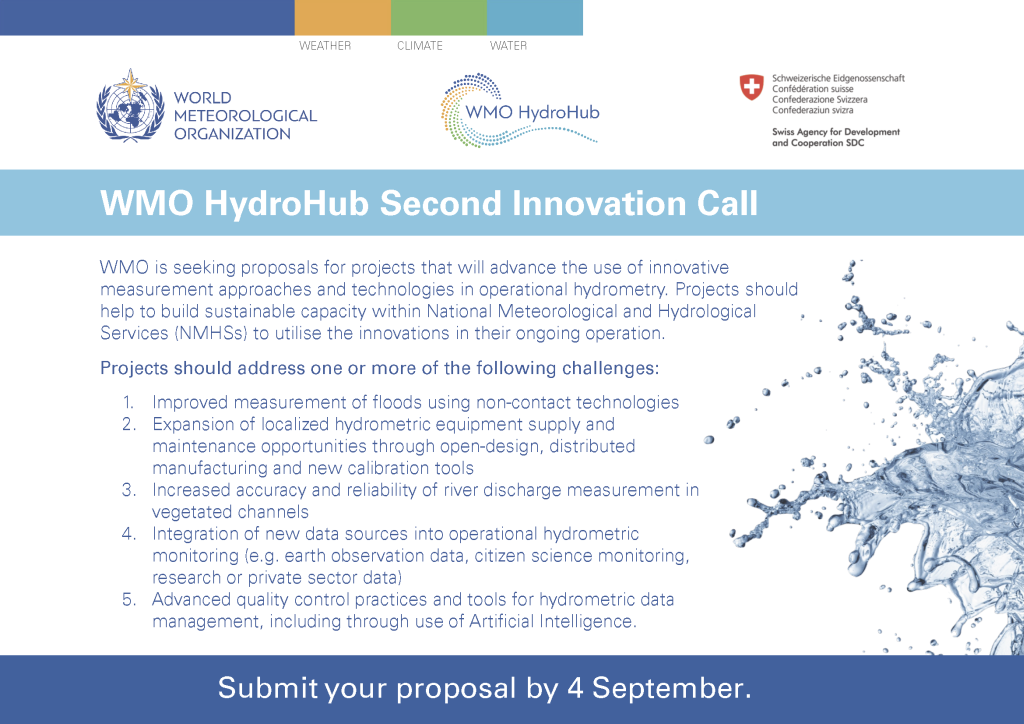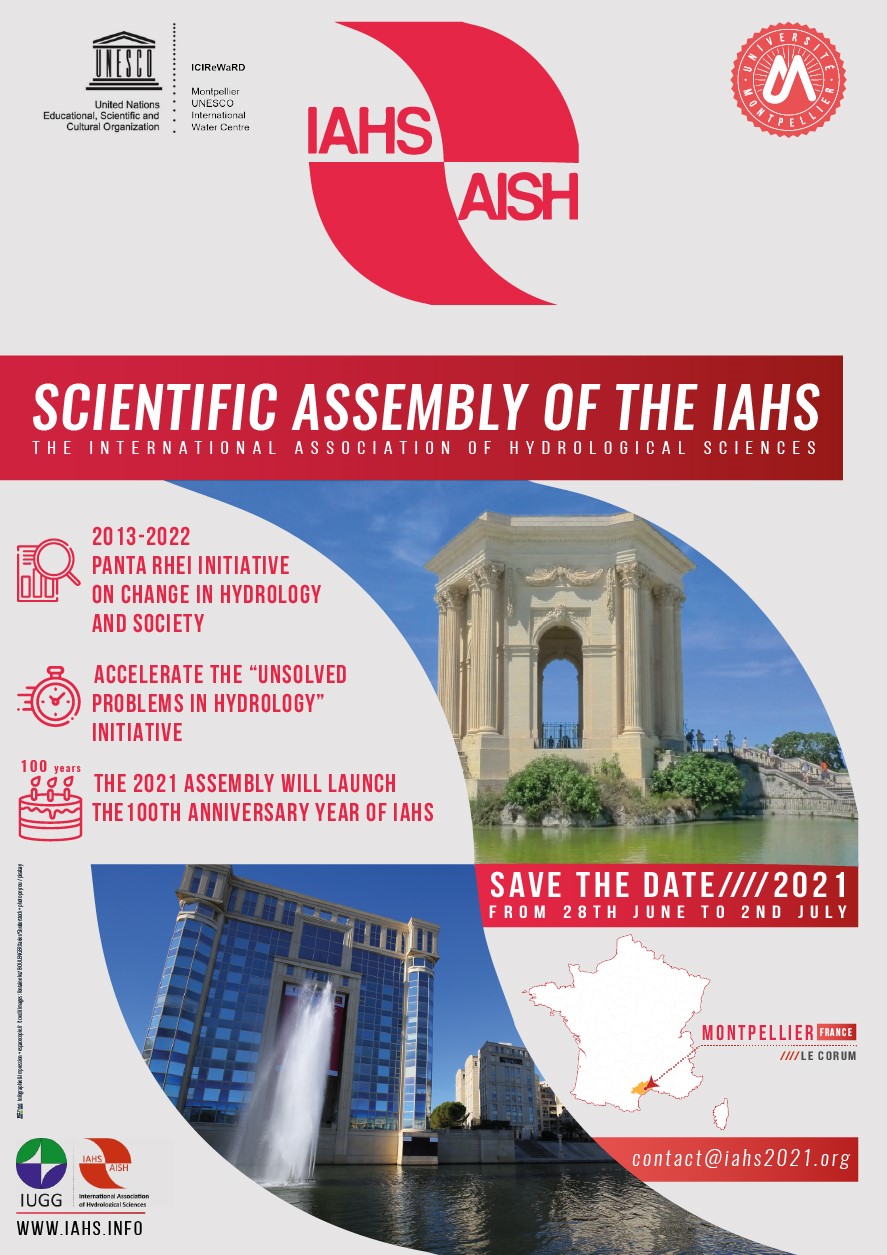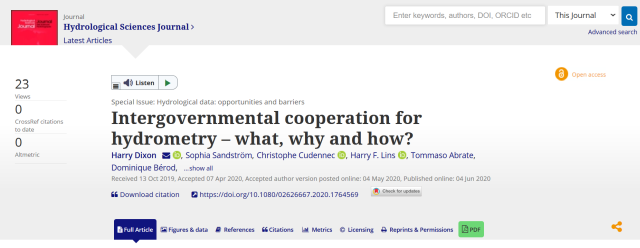IAHS News
International Hydrology Prize – Call for nominations
The International Hydrology Prize is awarded annually by IAHS, with UNESCO and WMO, to two people who have made an outstanding contribution to hydrological science. More information, including the list of previous awards, is available at
https://iahs.info/About-IAHS/Competition--Events/International-Hydrology-Prize.do
Nominations for the Prize are made by National Committees to IAHS, National Committees to the UNESCO-IHP or National Hydrological Advisors to the WMO, and forwarded to the Secretary General of IAHS for consideration by the Nomination Committee. The Committee consists of the President and a Vice-President of IAHS, as well as representatives from UNESCO and WMO.
Two medals are awarded under the International Hydrology Prize: the Dooge medal and the Volker medal. Both medals are intended to distinguish outstanding achievements by hydrological scientists but with a different focus. The Dooge medal is aimed at fundamental contributions to the science of hydrology, whereas the Volker medal is aimed at outstanding applications of hydrological science for the benefit of society at large.
The following applies to both the Dooge and Volker medals:
- The International Hydrology Prize shall be awarded to persons who have made outstanding contributions to hydrology such as confers on the candidate universal recognition of his or her international stature.
- The contribution should have an identifiable international dimension extending beyond both the country of normal work and the specific field of interest of the candidate.
- The medals may be awarded to hydrologists of long international standing or to younger but active hydrologists who exhibit qualities of international leadership in the science or practice of hydrology.
- An active involvement in the work of IAHS and other international organisations in the field of hydrology should be counted as an advantage.
Specific considerations for the Dooge medal:
- The Dooge medal is particularly intended for hydrologists who have demonstrated scientific excellence, and have made fundamental contributions to the science of hydrology as evidenced by publications in the international scientific literature and other evidence of high standard.
- Preference should be given to candidates who have recently exhibited outstanding international leadership in the science of hydrology.
Specific considerations for the Volker medal:
- The Volker medal is dedicated for hydrologists who have applied their research and hydrological expertise to the benefit of society, addressing issues of public interest and development.
- Applications of hydrology to the benefit of developing countries would count as an advantage.
- Preference should be given to candidates who have contributed through both scientific and practical work, and who have made outstanding contributions to the Hydrology community as demonstrated by active involvement in the work of IAHS or other international hydrological associations.
Nomination format and procedure
Nominations should be received by the Secretary General of IAHS no later than 31 December 2020 – Christophe Cudennec at [email protected] – and consist of:
- a (max. 2, pages A4 format) nomination letter signed by a National Representative to IAHS, the President of a national committee of UNESCO-IHP, or a National Hydrological Advisor to the WMO, with one sentence citation (max. 200 characters), and stating why the nominee is the most qualified person to receive the Volker or Dooge medal, paying attention to the medal's dedication specified above;
- the nominee’s CV (max. 3 pages, A4 format) with an emphasis on the contribution to hydrological science and international scientific cooperation, providing clear information on the main criteria used for the evaluation and the specific considerations mentioned above.
- a list of the major scientific publications (max. 2 pages, A4 format).
Nominations are expected from the world diversity, and equally for female and male candidates.
Evaluation criteria
a) Outstanding contributions to hydrology evidenced by universal recognition of his or her international stature.
b) Identifiable contributions with international dimensions extending beyond both the country of normal work and the specific field of interest of the candidate.
c) For senior candidates prove of Hydrologists activities of long international standing, or for younger candidates, prove of being active hydrologists with qualities of international leadership in the science or practice of hydrology.
d) Active involvement in the work of IAHS and other international organizations in the field of hydrology is counted as an advantage.
e) Application of the hydrological research performed and the use of his/her expertise to the benefit of society and addressing issues of public interest and development.
f) Applications of hydrology to the benefit of developing countries counts as an advantage.
Publication of first Community paper on Citizen science AND HYdrology - CANDHY
The IAHS Citizens and Hydrology (CANDHY) working group was established at the IAHS Scientific Assembly in Port Elizabeth in July 2017.
CANDHY promotes multidisciplinary and trans-sectorial research integrating hydrology, and earth science with citizen and data science. The focus is to organize, share and disseminate ideas, tools, data and scientific knowledge gathered from multidisciplinary and trans-sectorial researches developing and testing innovative procedures and tools implementing crowdsourcing collaborative platforms, communication and outreach activities, active citizenship and public participation for water resource management.
CANDHY cooperates with the IAHS Measurements and Observations in the XXI Century (MOXXI) WG in addressing Panta Rhei science questions 1 and 5 that focus respectively on the identification of key gaps in the understanding of hydrological change, and on advancing monitoring and data analysis capabilities, also through opportunistic sensing, to predict and better manage hydrological change. CANDHY and MOXXI WGs merge efforts to address the Unsolved Problems in Hydrology (UPH) initiative defining the UPHs of the “Measurement and Data” section (UPHs 16, 17, 18) as well as the questions about the “Interfaces with society” (UPHs 21, 22, 23).
The newly published community paper identifies the fundamental components, thematic areas, and specifications of citizen science projects giving them structure and direction to advance research and achieve scientific breakthroughs in hydrology. The authoring team represent several universities and ongoing citizen science projects, WMO and IWMI secretariats, as well as UNESCO chairs across the World. The Hydrological Sciences Journal paper entitled ‘Citizens AND HYdrology (CANDHY): conceptualizing a transdisciplinary framework for citizen science addressing hydrological challenges’ is available open access at https://www.tandfonline.com/doi/full/10.1080/02626667.2020.1849707 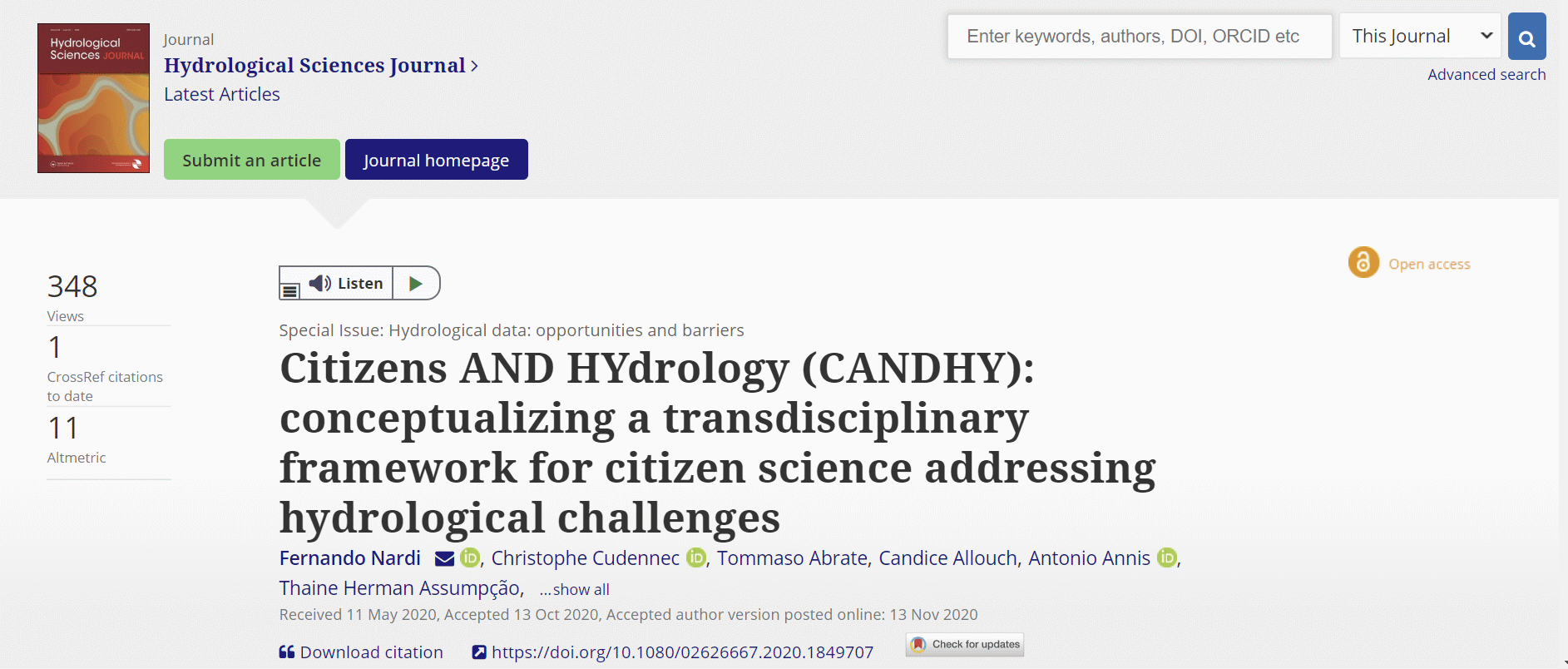
Become a CANDHY friend and/or a member of the working group via https://iahs.info/Commissions--W-Groups/Working-Groups/Candhy.do
The aims of the CANDHY WG align with the IAHS Measurements and Observations in the XXI century (MOXXI) WG. The free access community paper outlining the objectives of MOXXI can be found in the HSJ - https://doi.org/10.1080/02626667.2017.1420191
The CANDHY WG contributed to the Unsolved Problems in Hydrology (UPH) initiative defining the UPHs of the ‘Measurement and Data’ section and the questions about the ‘Interfaces with society’. Information on the UPH initiative can be found in the HSJ open access paper - https://doi.org/10.1080/02626667.2019.1620507
New date for the IAHS Scientific Assembly Montpellier 2022
Save the date: IAHS 2022 Scientific Assembly
Due to concerns over travel during the current pandemic the IAHS have decided to delay the next Scientific Assembly of the International Association of Hydrological Sciences (IAHS 2022). We confirm that the meeting will take place in Montpellier, France from 29 May to 3 June 2022.
This important biennial event will provide an opportunity to communicate, exchange and project on all major topics in the hydrological sciences within the framework of sessions organized by all IAHS Commissions and Working Groups with partners.
IAHS 2022 will have three major focuses:
· Panta Rhei decade (2013-2022) on change in hydrology and society
· UPH initiative, "Unsolved Problems in Hydrology"
· the 100th anniversary year of IAHS
This event will be accompanied throughout this week by many other "water-related" events for scientists, the general public and schoolchildren.
More information will follow soon.
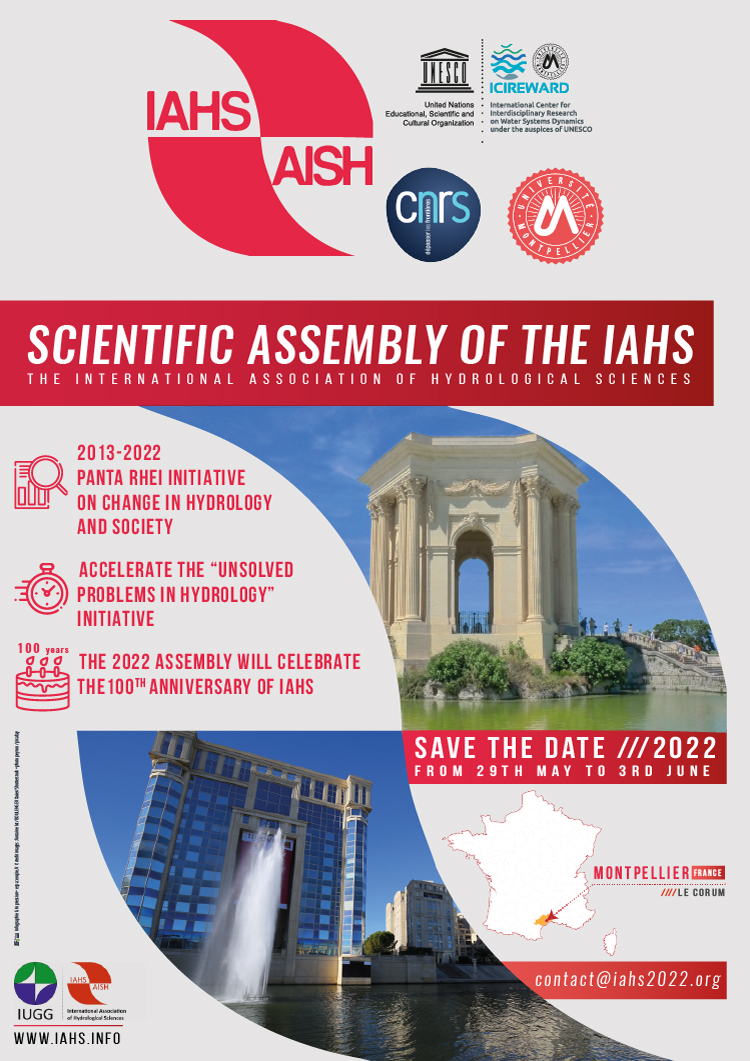
Online Seminar: Pollutant and Sediment Mobility in River Systems: Monitoring Studies to Identify Human Impacts
The School for Young Scientists "Pollutant and sediment mobility in river systems: monitoring studies to identify human impacts" will be held online on November 25-27, 2020. Join the broadcast and learn about environmental and human impacts on river channels and waters quality from various continents and river systems.
The program includes lectures by leading experts from Russia, USA, Germany, Great Britain, France, Belgium, Netherlands and Brazil on the problems of sediment and water quality and geochemistry of river systems:
- Adrian Collins, President of IAHS ICCE (Rothamsted Research, Okehampton, Devon, United Kingdom)
- Caroline Clason (University of Plymouth, United Kingdom)
- Sagy Cohen (Department of Geography, University of Alabama, Tuscaloosa, Alabama, United States)
- Bjoern Helm (Dresden University of Technology, Dresden, Germany)
- Jeff Nittrouer (Department Earth, Environmental and Planetary Sciences, Rice University, Houston, United States)
- Nikolay Kasimov (Lomonosov Moscow State University, Russia)
- Edgardo Latrubesse (Federal University of Goiás-Brazil, Brazil)
- Martina Flörke (Institute of Engineering Hydrology and Water Resources Management, Ruhr University Bochum, Bochum, Germany)
- Matthias Vanmaercke (Liège University, Belgium)
- Salomon Kroonenberg (Delft University of Technology, Delft, Netherlands)
- Daniel Karthe (German-Mongolian Institute for Resources and Technology, Germany)
The working language of the School is English.
Participation is free of charge based upon registration by November 24, 2020 via the website https://megapolis2020.ru/. A link to the broadcast (zoom and youtube interface) will be sent to registered participants.
The School for Young Scientists dedicated to the study of river systems is held by the Faculty of Geography of Moscow State University with the financial support of the Russian Science Foundation (grant No. 19-77-30004). Co-organizers - Russian Geographical Society, International Commission on Continental Erosion of the International Association of Hydrological Sciences (ICCE - IAHS).
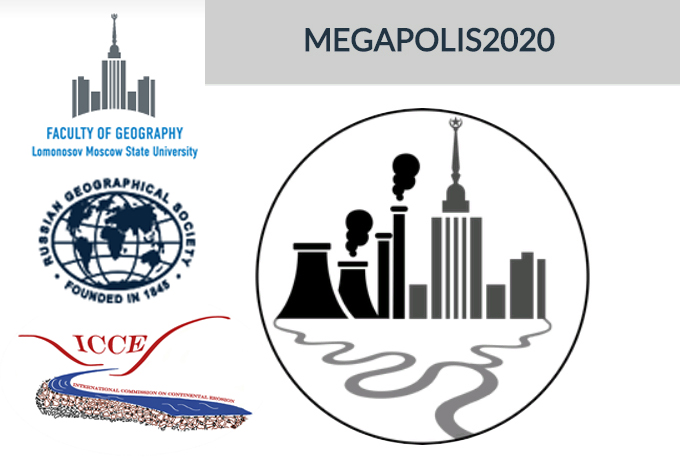
International Hydrology Prize – Call for nominations before 31st December 2020
The International Hydrology Prize is awarded annually by IAHS, with UNESCO and WMO, to two people who have made an outstanding contribution to hydrological science. More information, including previous awards, is available at
Nominations for the Prize are made by National Committees to IAHS, National Committees to the UNESCO-IHP or National Hydrological Advisors to the WMO, and forwarded to the Secretary General of IAHS for consideration by the Nomination Committee. The Committee consists of the President and a Vice-President of IAHS, as well as representatives from UNESCO and WMO.
Two medals are awarded under the International Hydrology Prize: the Dooge medal and the Volker medal. Both medals are intended to distinguish outstanding achievements by hydrological scientists but with a different focus. The Dooge medal is aimed at fundamental contributions to the science of hydrology, whereas the Volker medal is aimed at outstanding applications of hydrological science for the benefit of society at large.
The following applies to both the Dooge and Volker medals:- The International Hydrology Prize shall be awarded to persons who have made outstanding contributions to hydrology such as confers on the candidate universal recognition of his or her international stature.
- The contribution should have an identifiable international dimension extending beyond both the country of normal work and the specific field of interest of the candidate.
- The medals may be awarded to hydrologists of long international standing or to younger but active hydrologists who exhibit qualities of international leadership in the science or practice of hydrology.
- An active involvement in the work of IAHS and other international organisations in the field of hydrology should be counted as an advantage.
Specific considerations for the Dooge medal:
- The Dooge medal is particularly intended for hydrologists who have demonstrated scientific excellence, and have made fundamental contributions to the science of hydrology as evidenced by publications in the international scientific literature and other evidence of high standard.
- Preference should be given to candidates who have recently exhibited outstanding international leadership in the science of hydrology.
Specific considerations for the Volker medal:
- The Volker medal is dedicated for hydrologists who have applied their research and hydrological expertise to the benefit of society, addressing issues of public interest and development.
- Applications of hydrology to the benefit of developing countries would count as an advantage.
- Preference should be given to candidates who have contributed through both scientific and practical work, and who have made outstanding contributions to the Hydrology community as demonstrated by active involvement in the work of IAHS or other international hydrological associations.
Nomination format and procedure
Nominations should be received by the Secretary General of IAHS no later than 31 December 2020 – Christophe Cudennec at [email protected] – and consist of:
- a (max. 2, pages A4 format) nomination letter signed by a National Representative to IAHS, the President of a national committee of UNESCO-IHP, or a National Hydrological Advisor to the WMO, with one sentence citation (max. 200 characters), and stating why the nominee is the most qualified person to receive the Volker or Dooge medal, paying attention to the medal's dedication specified above;
- the nominee’s CV (max. 3 pages, A4 format) with an emphasis on the contribution to hydrological science and international scientific cooperation, providing clear information on the main criteria used for the evaluation and the specific considerations mentioned above.
- a list of the major scientific publications (max. 2 pages, A4 format).
Nominations are expected from the world diversity, and equally for female and male candidates.
Evaluation criteria
a) Outstanding contributions to hydrology evidenced by universal recognition of his or her international stature.
b) Identifiable contributions with international dimensions extending beyond both the country of normal work and the specific field of interest of the candidate.
c) For senior candidates prove of Hydrologists activities of long international standing, or for younger candidates, prove of being active hydrologists with qualities of international leadership in the science or practice of hydrology.
d) Active involvement in the work of IAHS and other international organizations in the field of hydrology is counted as an advantage.
e) Application of the hydrological research performed and the use of his/her expertise to the benefit of society and addressing issues of public interest and development.
f) Applications of hydrology to the benefit of developing countries counts as an advantage.
‘Hydrological processes and water security in a changing world’ from the 8th Global UNESCO FRIEND Water Conference is now available as PIAHS Volume 383
The papers from the 8th Global UNESCO FRIEND Water Conference ‘Hydrological Processes and Water Security in a Changing World’ are now available open access as PIAHS Volume 383.
https://piahs.copernicus.org/articles/383/index.html
The 8th Global FRIEND conference was co-organized by UNESCO and Government of China, with the focus on the theme of hydrological processes and water security in a changing world, under which eight thematic topics were discussed during the conference:
(1) hydrological observations under the changing environment and scarcity;
(2) river regimes and hydrological extremes under the changing environment;
(3) simulation and prediction of surface water and groundwater processes under the impact of human activities;
(4) urban hydrology and sponge city;
(5) multi-objective water resources allocation and operation;
(6) integrated watershed management including eco-hydrology and socio-hydrology;
(7) water quality and sediment transport; and
(8) river health and ecological baseflow under changing environment.
The conference explored how society, water systems and the environment interact under changing conditions. It highlighted the advance in hydrological science and innovation in water management, as well as the solutions to improve this relationship, particularly in view of contributing to the 2030 Agenda and the Paris Agreement. For the first time the two IHP programs FRIEND and Ecohydrology jointly organized a side event about the importance to bring ecological solutions to hydrological problems.
Save the date reminder: IAHS 2021 Scientific Assembly
The next Scientific Assembly of the International Association of Hydrological Sciences (IAHS 2021) will take place in Montpellier, France from 28 June to 2 July 2021.
This important biennial event will provide an opportunity to communicate, exchange and project on all major topics in the hydrological sciences within the framework of sessions organized by all IAHS Commissions and Working Groups.
IAHS 2021 will have three major focuses:
· Panta Rhei initiative (2013-2022) on change in hydrology and society
· UPH initiative, "Unsolved Problems in Hydrology"
· Launch of the 100th anniversary year of IAHS
This event will be accompanied throughout this week by many other "water-related" events for scientists, the general public and schoolchildren.
WMO HydroHub Second Innovation Call
The World Meteorological Organization is seeking proposals for projects that will advance the use of innovative measurement approaches and technologies in operational hydrometry.
IAHS is a strong partner of the WMO HydroHub initiative.
Website: https://hydrohub.wmo.int/en/news-events/wmo-hydrohub-second-innovation-call
Save the date: IAHS 2021 Scientific Assembly
The next Scientific Assembly of the International Association of Hydrological Sciences (IAHS 2021) will take place in Montpellier, France from 28 June to 2 July 2021.
This important biennial event will provide an opportunity to communicate, exchange and project on all major topics in the hydrological sciences within the framework of sessions organized by all IAHS Commissions and Working Groups.
IAHS 2021 will have three major focuses:
· Panta Rhei initiative (2013-2022) on change in hydrology and society
· UPH initiative, "Unsolved Problems in Hydrology"
· Launch of the 100th anniversary year of IAHS
This event will be accompanied throughout this week by many other "water-related" events for scientists, the general public and schoolchildren.
More information will follow soon.
Intergovernmental cooperation for hydrometry – what, why and how?
IAHS wish to highlight a new paper in the HSJ Special Issue on Hydrological data: opportunities and barriers which will be of interest to the members active in hydrometry across the world. The open access paper details the WMO mechanisms on hydrometry and illustrates the strong inputs IAHS provides as a partner to WMO activities in the field of hydrology.
Intergovernmental cooperation for hydrometry – what, why and how?
Harry Dixon, Sophia Sandström, Christophe Cudennec, Harry F. Lins, Tommaso Abrate, Dominique Bérod, Igor Chernov, Nirina Ravalitera, Daniel Sighomnou & Florian Teichert
https://www.tandfonline.com/doi/full/10.1080/02626667.2020.1764569
Two thirds of hydrological observation networks in developing countries are reported to be in poor or declining condition. At the same time innovation in sensor technologies and data processing are presenting opportunities for enhancing observation networks that are not being realized. The WMO HydroHub was launched in 2016 to transform assistance to operational water monitoring agencies around the world. If successful, the initiative will increase the amount of hydrometric data available to researchers, catchment managers and water policy makers. To those unfamiliar with UN organizations, however, the nature of such initiatives, the reasoning behind the decisions taken to establish them and the mechanisms by which they try to deliver benefits for society, can be opaque. This paper adopts a novel dialogue-style format to explore the set-up of the WMO HydroHub and build awareness amongst those who ultimately may benefit from its approaches.
This paper is just one example of the firm partnership between the IAHS and the Commission of Hydrology of WMO for over 50 years which ensures a link with the latest developments in the hydrological sciences. Together with UNESCO, IAHS and WMO award the annual International Hydrology Prize medals to two people who have made an outstanding contribution to hydrological science.

